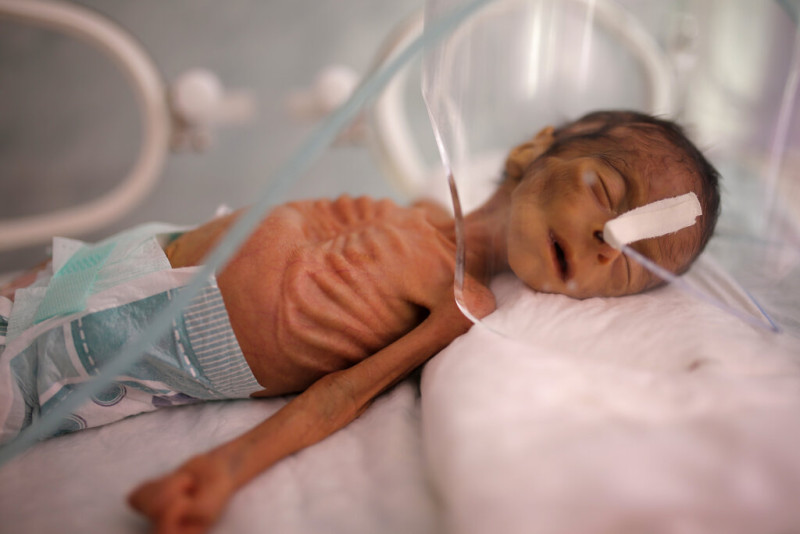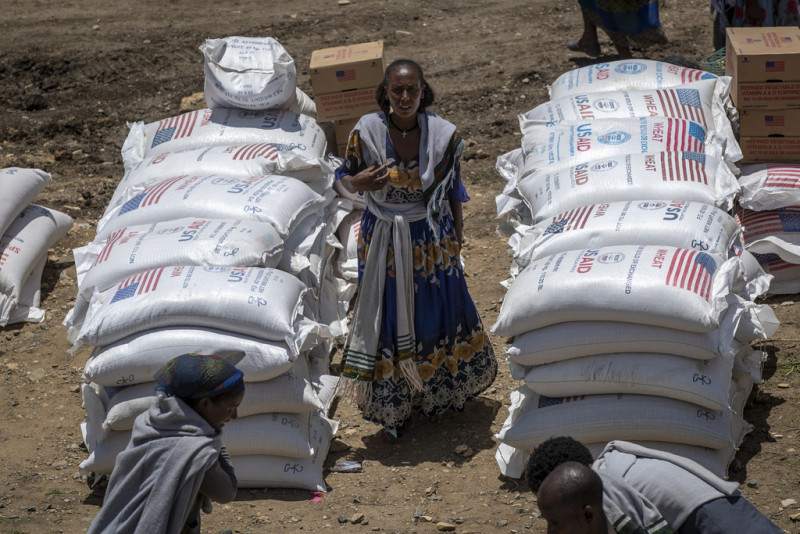Global concern about the consequences of vital importance of the decision of the world’s largest aid sponsor – what does Trump decision really mean
The Trump government’s attempt to cut and reshape American external help amputations is amputated the complex global system aimed at preventing and tackling hunger.
Struggling to manage food crises that scan the developing world even before the US president Donald Trump Returning to the White House, the International Loss Monitoring and Relief System has suffered multiple blows. Even more is expected to suffer from the sudden interruption of US external aid.
The freezingwhich Trump ordered his duties on January 20th, is supposed to last 90 days, while his government is reviewing all foreign aid programs. Foreign Minister Mark Rubio He said an exception allows the continued emergency food aid to continue.
However, much of this emergency aid has been stopped at least temporarily, as humanitarian organizations are seeking clarity about the aid programs that are allowed to continue. The problem is exacerbated by Trump’s move this week to close the top US government aid body, US International Development Organization (USAID).
About $ 500,000 tonnes of food worth $ 340 million are in vacuum, transit or storage, as humanitarian organizations are waiting for the approval of the US Foreign Ministry to distribute them, the Marcia Wonga former USAID senior official who has been informed of the situation.
Cash assistance provided by the US to help people buy food and other essentials in Sudan and Gaza has also stopped, they said in Reuters Humanitarian employees. The same is true of funding for food that they offer volunteers, an effort supported by America in Sudan to help people in areas not accessible to traditional help.
The efforts of the humanitarian organizations to pay for emergency food businesses have fallen into disrepair. Questions about which programs are allowed to continue left unanswered because people who usually submit such surveys – USAID executives – have been on leave, said at least six sources.
The Famine Early Warning Systems Network (FEWS NET), the US service that produced regular food safety alerts to prevent famine has also closed. Its loss leaves humanitarian organizations without a basic source of guidance on where and how to develop humanitarian aid.
And the US government has issued a stoppage orders to two major nutritional supplements, reducing the supply of foods that save lives for severe malnourished children worldwide.
“We are the only thing that almost everyone agrees – that young children who starve and need emergency measures need help,” said Mark Moore, Managing Director of Mana Nutrition of Georgiaone of the two suppliers ordered to stop producing supplements. “It is not an advertising campaign or speculation or distortion of truth or even a questionable use of statistics to say that hundreds of thousands of malnourished children could die without the USAID.”
Shortly after the publication of this story, the US government informed Mana and the other manufacturer, Edesia Nutrition by Rhodes Island, that the task breaks had been canceled.
Waiting stocks
Conflict leads a large number of people in desperate hunger and The US is the largest help sponsor. It has provided $ 64.6 billion in humanitarian aid over the last five years. That was at least the 38% of all these contributions recorded by the United Nations.
In 2023, nearly 282 million people in 59 countries and regions faced extreme food deficiencies that threatened their lives or living, according to the 2024 World Report on Food crises.
Even before the cessation of US aid, the global system of fighting hunger was under huge pressure due to conflict and political instability, as explained by the Reuters. The interruption of aid creates a dual crisis for humanitarian organizations working to relieve the strong food crisis. It hurts programs aimed at preventing mass hunger. More directly, it neglects programs that are intended to respond to judgments and save lives.
Among the food aid that is in vacuum all over the world is nearly 30,000 tonnes intended for the diet of children and adults who are severely malnourished in the Sudantwo employees of help there were there. They are held in warm warehouses, where they are in danger of spoiling, they said.
Food includes lentils, rice and wheat, one of the workers said – enough to feed at least 2 million people for a month. Some species have an expiration date soon and will be non -edible until the end of Trump’s 90 -day cessation.
Help groups have been confused about which relief programs are qualified for free freezing exemptions and whether they will be able to receive them – because most of the USAID staff has been licensed.
Steering
In the long run, the closure of the FEWS NET is going to amputate the ability of the world to predict, prevent and respond to food insecurity crises.
Created by the US government in 1985 after disastrous famines in East and West Africa, it is funded by USAID and managed by Chemonics International based in Washington. FEWS NET is in charge of providing early warning to US policymakers on food crises that could require humanitarian response. It uses data from federal services, scientists and other humanitarian organizations to produce a flow of food security reports. USAID and humanitarian organizations used FEWS NET reports to decide where to send food aid.
Researchers who collect and analyze data on food insecurity and famine say that FEWS NET is essential for global efforts to fight hunger. They say it may be more agile and productive than UN -backed organization IPCa comprehensive food classification and safety system that mentions food insecurity in dozens of countries.
In most areas where it operates, the IPC requires consensus on its findings between the local authorities and representatives of other humanitarian bodies. This can lead to political efforts to influence her work and to delay and prevent her efforts from warning the world of an apparent crisis, according to a recent study of Reuters.
The Fews Net does not face these consensus requirements, so it is faster and more effective, the researchers say. In 2024, Fews Net produced more than 1.000 prospects for food insecurity, notifications and other reports covered by more than 34 countries. IPC published 71 reports in 33 countries.
IPC refused to comment on the closure of the Fews Net. The ‘impact on the initiative remain unclear’said the Frank Nyakairurepresentative of IPC.
On January 27, Chemonics, which manages FEWS NET, was instructed by USAID work. Two days later, the Wews Net website closed, eliminating the public’s access to thousands of reports funded by US taxpayers.
“Finishing the Fews Net is like getting the steering wheel out of the car”said the Andrew NatsiosProfessor at Texas A&M University who was head of USAID from 2001 to 2006. “Even if the car works well, if there is no steering wheel, you don’t know where the car is going.”
The Fews Net was an important ally in evaluating food insecurity in most of the worst food crises in the world. As an important duct to the IPC and the global humanitarian system, its reports offered a strategic analysis of how conflicts and other problems affect food insecurity in specific places.
Without the Fews Net, ‘The most important element of the IPC system has been put out’said the Alex de WaalExecutive Director of World Peace Foundation at the Tuft University Fletcher School.
In December, the Sudanese government was maneuvering to delay the identification of famine in Darfour. The Fews Net, which had already come to the conclusion that there was a crisis there, pushed to convene the IPC port review committee due to the objections of Sudanese officials. In the end, the IPC Committee agreed to announce that starvation struck Zamzam, a huge camp for internal displaced in North Darfour.
But Fews Net’s tendency to issue “raw” ratings has “lit fire” in Washington. In December, the FEWS NET published an exhibition that provided for famine until early 2025 in part of northern Gaza. After issuing the report, the Jack LiuUS ambassador to Israel from October 2023 to January 2024, wrote that it was “irresponsible” to issue such a finding. Fews Net withdrew the report, stating that its notice was ‘Under further examination’ And that he was expected to inform the report in January.
With the cessation of the USAID financier, FEWS NET employees say they are not optimistic about resuming the organization’s work.
His closure leaves “a gap” in reports of humanitarian crises, he said Chris Newtonanalyst specializing in timely warning and food security at International Crisis Groupa thought tank based in Brussels. Loss of Fews Net will harm efforts to end the famine at Sudan and preventing other hotspots and could lead to the collapse of a broad network of data providers, all vital to understanding humanitarian dangers worldwide, he said.
“Loss disappeared from the world in the 2000s and now his return will probably accelerate as we become more and more blind to him, especially when he becomes a political and war tool.”said Newton.
Source :Skai
With a wealth of experience honed over 4+ years in journalism, I bring a seasoned voice to the world of news. Currently, I work as a freelance writer and editor, always seeking new opportunities to tell compelling stories in the field of world news.












